Related Research Articles

Board games are tabletop games that typically use pieces. These pieces are moved or placed on a pre-marked board and often include elements of table, card, role-playing, and miniatures games as well.

Monopoly is a multi-player economics-themed board game. In the game, players roll two dice to move around the game board, buying and trading properties and developing them with houses and hotels. Players collect rent from their opponents, aiming to drive them into bankruptcy. Money can also be gained or lost through Chance and Community Chest cards and tax squares. Players receive a stipend every time they pass "Go" and can end up in jail, from which they cannot move until they have met one of three conditions. House rules, hundreds of different editions, many spin-offs, and related media exist. Monopoly has become a part of international popular culture, having been licensed locally in more than 103 countries and printed in more than 37 languages. As of 2015, it was estimated that the game had sold 275 million copies worldwide.
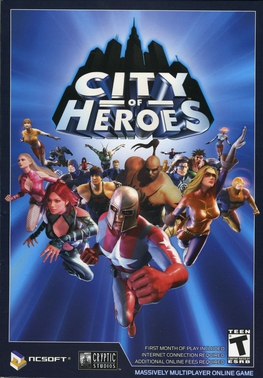
City of Heroes (CoH) was a massively multiplayer online role-playing game which was developed by Cryptic Studios and published by NCSOFT. The game was launched in North America on April 28, 2004, and in Europe by NCsoft Europe on February 4, 2005, with English, German and French servers. In the game, players created super-powered player characters that could team up with others to complete missions and fight criminals belonging to various gangs and organizations in the fictional Paragon City.

SolarQuest is a space-age real estate trading board game published in 1985 and developed by Valen Brost, who conceived the idea in 1976. The game is patterned after Monopoly, but it replaces pewter tokens with rocket ships and hotels with metallic fuel stations. Players travel around the sun acquiring monopolies of planets, moons, and man-made space structures. They seek to knock their opponents out of the game through bankruptcy, as well as optional laser blasts and dwindling fuel supplies.
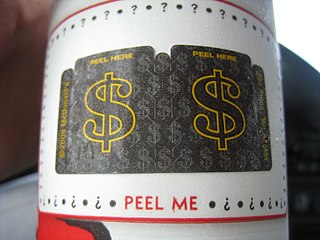
The McDonald's Monopoly game is a sales promotion run by fast food restaurant chain McDonald's, with a theme based on the Hasbro board game Monopoly. The game first ran in the U.S. in 1987 and has since been used worldwide.

Monopoly Tycoon is a construction and management simulation PC game published in 2001. The player operates a business that owns stores and apartments in a city derived from the Monopoly board game. Instead of using dice, the game relies more on the speed and innovativeness of the players. In the standard mode, the user plays against the AI opponents. In the multiplayer version, players go against other online players in order to gain victory.

Wily & Right no RockBoard: That's Paradise is a business simulator video game developed and published by Capcom for the Family Computer exclusively in Japan in 1993. It is a spin-off video game to the original Mega Man series. It is similar to the board game Monopoly, in which players and the computer AI take turns going around a set of connected circles, buying up property, and charging other participants rent when they land on those spaces.

There have been numerous Monopoly video games based on the core game mechanics of Parker Brothers and Hasbro's board game Monopoly. They have been developed by numerous teams and released on multiple platforms over 35+ years.

The board game Monopoly has its origin in the early 20th century. The earliest known version, known as The Landlord's Game, was designed by Elizabeth Magie and first patented in 1904, but existed as early as 1902. Magie, a follower of Henry George, originally intended The Landlord's Game to illustrate the economic consequences of Ricardo's Law of economic rent and the Georgist concepts of economic privilege and land value taxation. A series of board games was developed from 1906 through the 1930s that involved the buying and selling of land and the development of that land. By 1933, a board game had been created much like the modern version of Monopoly sold by Parker Brothers and its related companies through the rest of the 20th century, and into the 21st. Several people, mostly in the midwestern United States and near the East Coast of the United States, contributed to design and evolution.
Easy Money was a board game introduced by Milton Bradley Company in 1935. Like Monopoly, the game is based on The Landlord's Game in the movement of pieces around the board, the use of cards, properties that can be purchased, and houses that can be established on them.
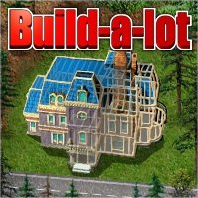
Build-a-lot is a 2007 casual video game for Microsoft Windows. The object of the game is to construct, upgrade and sell houses for profits. They can flip houses for quick cash or collect rent to make funds go up. Players help mayors from eight different areas and through 35 different levels to complete the game. Build-a-lot was created by HipSoft. It has also been ported to Mac OS X by Red Marble Games. In 2009 it was ported to mobile phones, iOS systems and BlackBerry's by Glu Mobile. It was ported to the Nintendo eShop and DSI shop on August 18, 2011. In July 2013, Build-a-lot 3 and Build-a-lot 4: Power Source was ported to Android by Glu Mobile again

A board wargame is a wargame with a set playing surface or board, as opposed to being played on a computer or in a more free-form playing area as in miniatures games. The modern, commercial wargaming hobby developed in 1954 following the publication and commercial success of Tactics. The board wargaming hobby continues to enjoy a sizeable following, with a number of game publishers and gaming conventions dedicated to the hobby both in the English-speaking world and further afield.

Monopoly: The Mega Edition is a special variant of the popular board game Monopoly. The game was first published on May 22, 2006 by Winning Moves Games USA in the USA. A UK version was adapted on October 1, 2007.

Mario is a media franchise, produced and published by video game company Nintendo, created by Japanese game designer Shigeru Miyamoto and starring the fictional Italian plumber Mario. It is primarily a video game franchise, but has extended to other forms of media, including television series, comic books, a 1993 feature film, an upcoming 2023 animated film and theme park attractions. The series' first installment was 1983's Mario Bros., although Mario had made his first appearance in 1981's Donkey Kong, and had already been featured in several games of the Donkey Kong and Game & Watch series. The Mario games have been developed by a variety of developers including Nintendo, Hudson Soft, and AlphaDream. Most Mario games have been released exclusively for Nintendo's various video game consoles and handhelds, from the third generation onward.
Family Game Night was an American television game show based on Hasbro's family of board games and EA's video game franchise of the same name. The show was hosted by Todd Newton. Burton Richardson was the announcer for the first two seasons; he was replaced by Stacey J. Aswad in the third season, and Andrew Kishino was hired for the fourth season. The 60-minute program debuted on October 10, 2010, on The Hub which was Discovery Kids. The network became Discovery Family on October 13, 2014; it was previewed on October 9, 2010, on its sister channel, TLC. Seasons 1 and 2 each contained 26(1) and 30(2) episodes. Seasons 3, 4 and 5 each contained 15 episodes. Season 2 premiered on Friday, September 2, 2011, with additional games being added. The games added to the second season included Cranium Brain Breaks, Green Scream, Ratuki Go-Round, Simon Flash, Operation Sam Dunk, Trouble Pop Quiz, and Spelling Bee. However games from the previous season were still kept.
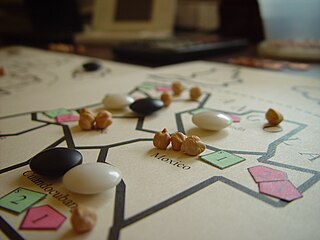
Game design is the process of creating and shaping the mechanics, systems, and rules of a game. Games can be created for entertainment, education, exercise, or experimental purposes. Increasingly, elements and principles of game design are also applied to other interactions, in the form of gamification. Game designer and developer Robert Zubek defines game design by breaking it down into its elements, which he says are the following:

Monopoly is a 1995 video game based on the board game Monopoly. Developed by Westwood Studios, published by Hasbro Electronic Entertainment and distributed by Virgin Interactive Entertainment. This title was one of many inspired by the property. It was later reissued in 1998 with a different box art.
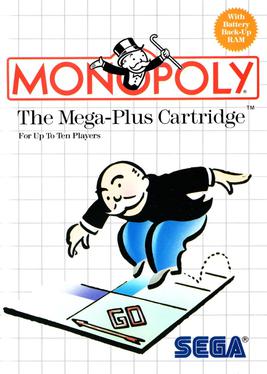
Monopoly is a Master System video game based on the board game Monopoly, released in 1988. Developed by American studio Nexa Corporation and published by Sega, this title was one of many inspired by the property. According to Game Freaks 365, the game was "one of the first real boardgames that was programmed" into a video game.

Monopoly is a video game based on the board game Monopoly, released on Game Boy, Genesis, NES, and SNES. Developed by Sculptured Software and published by Parker Brothers, this title was one of many inspired by the property.
References
- ↑ "Reveal Products". Revealgames.com. Retrieved 2014-06-06.
- 1 2 Oldenburg, Don (21 December 2000). "When Board Games Get Into Your Blood". Washington Post. Retrieved 2 February 2020.